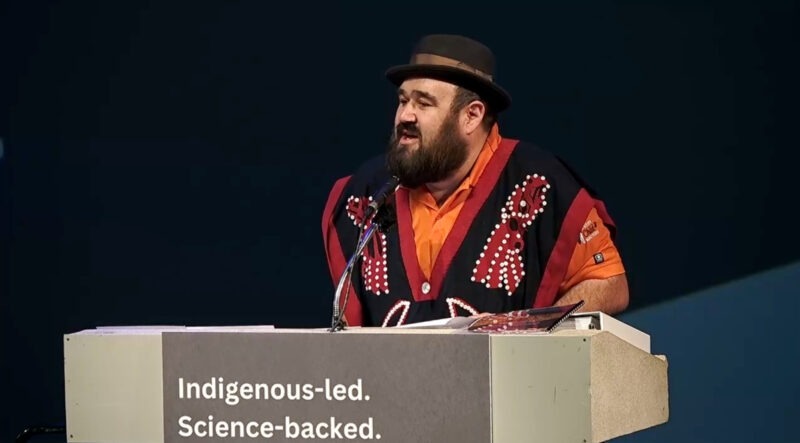Mega science review showcases the realities of salmon farming in BC
“We are going to take back what is being taken from us,” say First Nations as a scientific review showcases the realities of salmon farming operations in British Columbia.
By Fabian Dawson
SeaWestNews
British Columbia’s salmon farmers and their First Nation partners have released a comprehensive review of their aquaculture operations to showcase the importance of unifying traditional knowledge and western science in the sector as it transitions towards a new era.
The 500-page collaborative report, which was commissioned by the Coalition of First Nations for Finfish Stewardship, reinforces the socio-economic importance of the sector to the province and stresses that the future of salmon farming in BC must be determined by First Nations who want to farm fish in their traditional territories.
The ‘scientific textbook’ called Modern Salmon Farming in British Columbia: A Review, is also aimed at closing the knowledge gaps about the industry and counter the campaign of disinformation by anti-salmon farming opponents.
It was compiled by the BC Salmon Farmers Association (BCSFA) and the BC Centre for Aquatic Health Sciences (BC CAHS) with contributions and data from First Nations, Pacific Ocean scientists, sector and subject matter experts, government and eNGOS.
Topics covered in the publication across 13 chapters include the current state of Pacific salmon, sea lice, fish health, benthic conditions, incidental catch, mammal interactions, and First Nations stewardship.
The report comes at a critical juncture for the aquaculture industry in BC as the Federal government considers renewing salmon farming licences which expire this Spring pending the formulation of a Transition Plan for the sector in the province.
The Liberal government, at the behest of activists, has already shut down 40% of salmon farms since 2020, increasing carbon emissions and wiping out jobs that are the lifeblood of rural, coastal and Indigenous communities.
“We are going to take back what is being taken from us,” said Dallas Smith, spokesperson for the Coalition and member of the Tlowitsis Nation at a Press Conference in Campbell River today, held to launch the report.
“We will continue to use our voices and our best decisions for our communities, and we won’t be swayed by well-funded urban activists and outsiders with misinformed agendas,” said Smith, adding that all existing salmon farms in BC are supported by the First Nations communities that they operate in.
“Our leadership wants to make the best-informed decisions for our communities regarding the sector and our marine management plans. This is why we asked the BCSFA to put together a ‘textbook’ of information on fish farms that would answer the questions coming from our members.
“This collection of Western science and data is a good base for us to apply our rich traditional knowledge so that our leadership is armed with the holistic information we need to steward our waters and wild salmon, while protecting the social and economic health of our communities,” Smith said.
Smith said the Coalition will be sending copies of the report to First Nations across the province in the spirit of creating Nation-to-Nation dialogues and to provide a fulsome, holistic picture of what’s happening in the marine environment.
“BC coastal First Nations have been the stewards of our waters since time immemorial. Today, our stewardship includes both conservation and exploration of marine-based economic opportunities for our communities, like salmon farming.
“At a time when Canadians are worried about food security, food affordability, and climate change, our communities have both the traditional knowledge and now a textbook of scientific evidence to choose how to best include salmon farming in our ocean and economic planning,” Smith said.
Brian Kingzett, Executive Director of the BCSFA, said the scientific review document launched today reinforces the sector’s position as a responsible contributor to the economy, the environment, and the well-being of coastal communities.
“The review will be a valuable resource for all individuals seeking to comprehensively understand the reality of salmon farming in British Columbia,” he said.
Dr. Ahmed Siah, Managing Director of BC CAHS, an Indigenous-governed and science-led independent non-profit said the review document aligns with many of his organisation’s values, goals, practices, and priorities.
The collaborative publication serves as an inspiring example of what happens when First Nations are given a leadership seat at the table of Western science, especially when it concerns their traditional territories, said Siah.
By The Numbers:
500 – Modern Salmon Farming in British Columbia: A Review contains over 500 citations from scientific studies and research, government data, eNGO data, industry data, and other external references.
12 – There are currently over a dozen coastal First Nations hosting finfish farms in their territories in BC. These Nations make up a substantial area of BC’s southwest coast, from Central/Western Vancouver Island up to the Central Coast.
$1.142 billion – BC salmon farmers generate over $1.142 billion of direct economic activity in BC annually, with $51 million in revenue going to First Nations.
6,000 – The sector produces 38 million meals annually and approximately 6,000 direct and indirect jobs, 500 of those being Indigenous.
$1 billion – The combined direct, indirect and induced economic activity contributes more than a billion dollars to GDP, providing rural economic opportunities that support healthy and thriving communities and families.
375 – The sector supports up to 375 community organizations and charities each year, further enhancing the social fabric of coastal communities.
60 – The BC Salmon Farmers Association (BCSFA) represents over 60 businesses and organizations throughout the value chain of finfish aquaculture in BC. members account for over 95% of the annual provincial harvest of farm-raised salmon in British Columbia. Its members account for over 95% of the annual provincial harvest of farm-raised salmon in British Columbia.
(Submitted image shows Dallas Smith of the Coalition of First Nations for Finfish Stewardship at the Press Conference in Campbell River to launch the report called Modern Salmon Farming in British Columbia: A Review)

